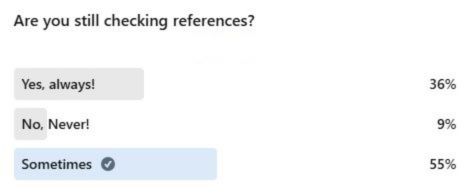Reference checks have been around forever, certainly as long as I’ve been in the business. They can involve confirming dates/titles/salaries from previous positions or having a detailed conversation with the candidate’s references.
Due to the complex and constantly evolving post-pandemic hiring market, the debate on whether or not reference checks are valuable is relevant now more than ever.
The pandemic shifted several tried and true “norms” in the industry such as how we screen and interview, the involvement of technology in the hiring process, and the increased role of the employer brand. Like in-person interviews and manually reviewing resumes, are reference checks losing relevance in this new era of recruiting?
I recently ran a poll on my LinkedIn to gauge how often my peers in recruiting and human resources are leveraging reference checks as part of their hiring processes.

As you can see, 91% of respondents are still regularly
checking references, but over half indicated that they are only conducting
reference checks in some cases. There is clearly still disagreement on
where this process fits into the hiring process, if at all. (I’m looking at
you, 9%).
Let’s take a look at some of the reasons for and against checking references.
Advantages of Reference Checks
- Crucial Insights: You can gain real-world examples and context from someone who has worked with the candidate in the past
- Quality Control: Reference checks allow you to mitigate poor hiring decisions by uncovering potential performance and/or technical issues that may have been missed during the interviews
- External Validation: If you have specific concerns about a candidate, you can (and should!) hone in on those specifically during your reference check conversation. You can probe for specific examples to gain a better understanding of the candidates’ capabilities
- Bias Reduction: Reduce bias during the interview process. By relying on independent, third-party, information, you reduce bias during your decision-making
Disadvantages of Reference Checks
- Difficult Verification: It’s very difficult to verify who you are actually speaking with. Is it truly the candidates former supervisor, or is it their uncle? 😊
- Sample Bias: As previously mentioned, references help reduce biases internally, however, references could be overly biased based on their relationship with the candidate
- Reference Selection: Naturally, a candidate will only provide references whom they are confident will speak highly of them, so how substantiative is the information you are getting?
- Limited Scope: References typically have only worked with a candidate at one previous position, so their insights may not be holistic on the candidate’s entire work history.
- Time: Quality reference checks take time, and for most HR professionals, there are not enough hours in the day to schedule time to vet each candidate’s references.
While reference checking is an art, not a science, I recommend that most employers do still take the time to conduct 2-3 professional references per candidate. Call me old school, but I firmly believe that it’s a solid part of the due diligence process that is more beneficial than not. That being said, employers should be aware that references are not foolproof and they should be only be one factor when deciding whether to make an offer to a candidate.
Employees are the heart of any organization, and finding the right people for the right roles requires time, intention, and expertise. If you’re looking to step up your recruiting game in 2025, visit our Recruiting Services page to learn more.





